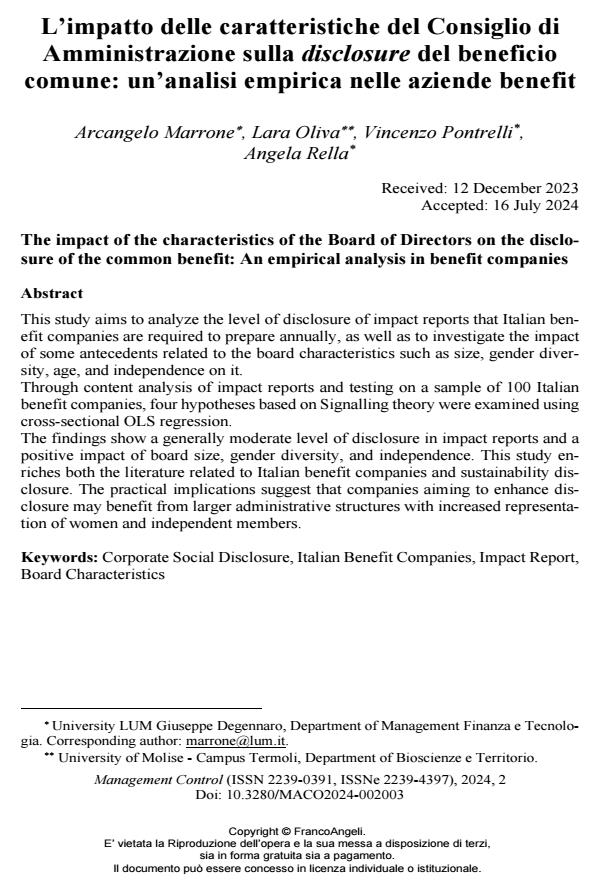L’impatto delle caratteristiche del Consiglio di Amministrazione sulla disclosure del beneficio comune: un’analisi empirica nelle aziende benefit
Titolo Rivista MANAGEMENT CONTROL
Autori/Curatori Arcangelo Marrone, Lara Oliva, Vincenzo Pontrelli, Angela Rella
Anno di pubblicazione 2024 Fascicolo 2024/2
Lingua Italiano Numero pagine 25 P. 39-63 Dimensione file 268 KB
DOI 10.3280/MACO2024-002003
Il DOI è il codice a barre della proprietà intellettuale: per saperne di più
clicca qui
Qui sotto puoi vedere in anteprima la prima pagina di questo articolo.
Se questo articolo ti interessa, lo puoi acquistare (e scaricare in formato pdf) seguendo le facili indicazioni per acquistare il download credit. Acquista Download Credits per scaricare questo Articolo in formato PDF

FrancoAngeli è membro della Publishers International Linking Association, Inc (PILA), associazione indipendente e non profit per facilitare (attraverso i servizi tecnologici implementati da CrossRef.org) l’accesso degli studiosi ai contenuti digitali nelle pubblicazioni professionali e scientifiche.
This study aims to analyze the level of disclosure of impact reports that Italian benefit companies are required to prepare annually, as well as to investigate the impact of some antecedents related to the board characteristics such as size, gen-der diversity, age, and independence on it. Through content analysis of impact reports and testing on a sample of 100 Italian benefit companies, four hypotheses based on Signalling theory were examined us-ing cross-sectional OLS regression. The findings show a generally moderate level of disclosure in impact reports and a positive impact of board size, gender diversity, and independence. This study en-riches both the literature related to Italian benefit companies and sustainability disclosure. The practical implications suggest that companies aiming to enhance disclosure may benefit from larger administrative structures with increased repre-sentation of women and independent members.
Parole chiave:Corporate Social Disclosure, Italian Benefit Companies, Impact Re-port, Board Characteristics
- Small but Impactful: The Growing Role of SMES in Sustainability and ESG Reporting Valentina Minutiello, Patrizia Tettamanzi, Michael Murgolo, in Corporate Social Responsibility and Environmental Management /2026 pp.925
DOI: 10.1002/csr.70199
Arcangelo Marrone, Lara Oliva, Vincenzo Pontrelli, Angela Rella, L’impatto delle caratteristiche del Consiglio di Amministrazione sulla disclosure del beneficio comune: un’analisi empirica nelle aziende benefit in "MANAGEMENT CONTROL" 2/2024, pp 39-63, DOI: 10.3280/MACO2024-002003